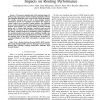Free Online Productivity Tools
i2Speak
i2Symbol
i2OCR
iTex2Img
iWeb2Print
iWeb2Shot
i2Type
iPdf2Split
iPdf2Merge
i2Bopomofo
i2Arabic
i2Style
i2Image
i2PDF
iLatex2Rtf
Sci2ools
JSAC
2006
2006
Study of BGP Peering Session Attacks and Their Impacts on Routing Performance
We present a detailed study of the potential impact of BGP peering session attacks and the resulting exploitation of Route Flap Damping (RFD) that cause network-wide routing disruptions. We consider canonical grid as well as down-sampled realistic Autonomous System (AS) topologies and address the impact of various typical service provider routing policies. Our modeling focuses on three dimensions of routing performance sensitivity: (a) Protocol aware attacks (e.g., tuned to RFD), (b) Route selection policy, and (c) Attack-region topology. Analytical results provide insights into the nature of the problem and potential impact of the attacks. Detailed packet-level simulation results complement the analytical models and provide many additional insights into specific protocol interactions and timing issues. Finally, we quantify the potential effect of the BGP Graceful Restart mechanism as a partial mitigation of the BGP vulnerability to peering session attacks.
| Added | 13 Dec 2010 |
| Updated | 13 Dec 2010 |
| Type | Journal |
| Year | 2006 |
| Where | JSAC |
| Authors | Kotikalapudi Sriram, Doug Montgomery, Oliver Borchert, Okhee Kim, D. Richard Kuhn |
Comments (0)

